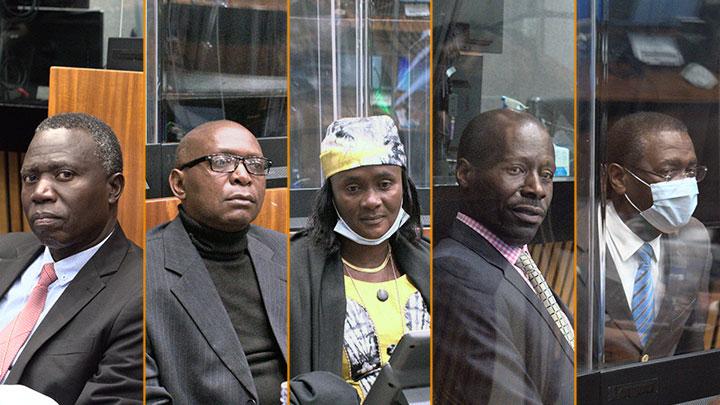Pronouncement of Judgement in the Nzabonimpa et al. contempt case

Today, Judge Vagn Joensen (Denmark) pronounced his Judgement in the case of Prosecutor v. Anselme Nzabonimpa et al. (MICT-18-116-T), convicting Mr. Augustin Ngirabatware, Mr. Anselme Nzabonimpa, Mr. Jean de Dieu Ndagijimana, and Ms. Marie Rose Fatuma of contempt for witness interference. The Single Judge also convicted Mr. Ngirabatware for contempt on the basis of violating court orders while entering a verdict of not guilty for a co-Accused, Mr. Dick Prudence Munyeshuli, on a single contempt charge for violations of court orders. Judge Joensen sentenced Mr. Ngirabatware to two years’ imprisonment. Mr. Nzabonimpa, Mr. Ndagijimana, and Ms. Fatuma were sentenced to time served, having spent over 11 months in pre-trial detention.
The case against the Accused was principally based on allegations of witness interference from 2015 into 2018 with key protected Prosecution witnesses who testified in Mr. Ngirabatware’s genocide trial before the International Criminal Tribunal for Rwanda (“ICTR”). These witnesses had been relied upon by an ICTR trial chamber in 2012 to convict Mr. Ngirabatware of incitement to commit genocide and genocide.
The witness interference was found to have occurred during preparations for review proceedings requested by Mr. Ngirabatware that sought to overturn his convictions based on purported recantations of these witnesses. The Single Judge found that the evidence demonstrated that money was paid and offered to witnesses to facilitate recantations of their trial testimonies and that the Accused sought to manipulate and improperly influence potential witness evidence in anticipation of Mr. Ngirabatware’s review proceedings. Mr. Ngirabatware, Mr. Nzabonimpa, Mr. Ndagijimana, and Ms. Fatuma were also charged with incitement to commit contempt but the Single Judge entered a finding of not guilty on this charge.
Mr. Ngirabatware was serving a sentence of 30 years’ imprisonment for his genocide convictions when the indictment against him was confirmed in October 2019, while his co-Accused were arrested more than a year earlier on 3 September 2018. The cases were joined in December 2019, and trial was supposed to start in June 2020. However, due to the COVID-19 pandemic, trial was delayed until October 2020. During the pronouncement, Judge Joensen praised the ingenuity and dedication of Mechanism staff that allowed proceedings to continue during the pandemic by creating a socially distanced and continuously sanitized court room and for making technical modifications that allowed remote participation in the proceedings from The Hague and Kigali.
Between 26 October 2020 and 9 April 2021, nine Prosecution witnesses and six Defence witnesses, including two Accused, testified in court. Nearly 2000 exhibits were admitted, including the evidence of an additional 37 witnesses whose testimony was provided by way of written procedure. The Single Judge pronounced his Judgement two days after the completion of closing arguments held between 21 and 23 June 2021.
During the course of proceedings, Judge Joensen issued around 200 decisions and orders. Significant decisions included denying a request to transfer the case to Rwanda, and a jurisdictional decision interpreting the scope of Mechanism’s statute to include incitement to commit contempt and dismissing joint criminal enterprise as a form of liability applicable to contempt offences. The case also involved decisions that affirmed the judiciary’s ability to unconditionally release defendants from pre-trial detention to ensure fair trial rights and evaluated material differences in conducting searches of digital – rather than physical – spaces and how that impacts the proper interpretation and application of warrants for search and seizure.
For a more information on the case, please visit the Nzabonimpa et al. case page to see the case’s information sheet on the Mechanism’s website.